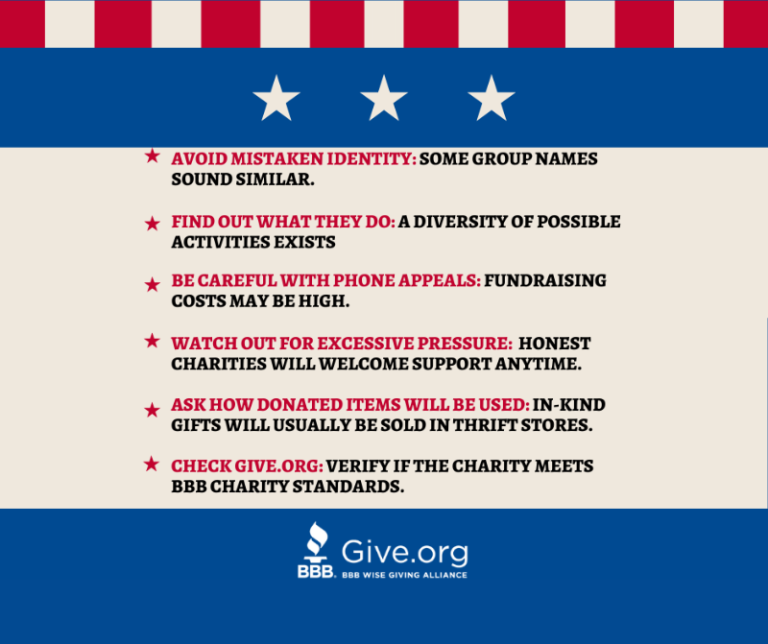Give.org and BBB Advise Hurricane Donors to Support Experienced Disaster Relief Charities

Arlington, VA (September 13, 2018) – BBB Wise Giving Alliance (Give.org) and Better Business Bureau advise donors that experienced disaster relief organizations are your best bet to provide emergency help for victims of Hurricane Florence. It’s also important for contributors to ask
about what activities their donations will fund.
“This is not amateur hour,” notes Art Taylor, president and CEO of BBB Wise Giving Alliance. “Give.org has seen crowdfunding posts from individuals claiming to raise funds so they can deliver and distribute water, food and flashlights
to impacted areas. Even if sincere, such efforts may risk lives, complicate access by professional efforts and potentially divert donations that could be directed in more helpful ways.”
“With such a devastating hurricane bearing down on the southeast coast of the United States, emotions are running high,” Taylor said. “While we all want to help those in harm’s way as soon as we can, donors should watch out
for newly created organizations that emerge that are either inexperienced in addressing disasters or may be seeking to deceive donors at a vulnerable time.”
BBB also expects to see price-gougers and “storm chasers” looking to make a quick buck off of preparation
and clean-up efforts (BBB.org/Storm). Consumers can report suspected scams to BBB Scam Tracker
(
BBB.org/ScamTracker) or the office of the Attorney General in their state.
BBB Wise Giving Alliance suggests that donors keep the following tips in mind to help avoid questionable appeals for support:
- Verify the trustworthiness of soliciting relief organizations by visiting Give.org to access
free reports that specify if the charity meets the 20 BBB Standards for Charity Accountability. - See if the charity has an on-the-ground presence in the impacted areas. Unless the charity already has skilled operations in the affected areas, it may be difficult to provide assistance quickly and effectively. See if the charity’s
website or appeal clearly describes what the charity can do to address immediate relief needs as well as longer-term recovery needs. - Find out if the charity is providing direct aid or is raising money for other groups. Some charities may be raising money to pass along to relief organizations. If so, you may want to consider “avoiding the middleman” and give
directly to charities that have a presence in the region. Appeals for disaster-related donations should clearly state how contributions will be used. - Be cautious about gifts of clothing, food or other in-kind donations. In-kind drives for food and clothing, while well-intentioned, may not be the quickest way to help those in need – unless the organization has the staff and infrastructure
to hand out such aid properly. Donated goods may impose extra costs on a charity to cover storage and distribution, and also may not meet the most urgent needs. - Understand crowdfunding. While there are resources like Give.org to help vet charities, it is difficult to vet individuals. If you decide to contribute to an individual via crowdfunding, it is safest to give to people you personally know
who have posted requests for assistance. Also remember that gifts to help a specific individual generally are not deductible as charitable donations for federal income tax purposes. Also check the terms and conditions of the crowdfunding platform
to learn how your donation might be affected.
For additional disaster giving tips visit this link at Give.org
The emergency phase of a disaster is just the beginning. Full recovery from a disaster will be a long-term activity that can take many months or years to accomplish, depending on the extent of the damage. Those truly concerned
about helping communities bounce back will have many opportunities to help in the future.
The following is a list of BBB Accredited Charities (i.e., organizations that meet the 20 BBB Standards for Charity Accountability)
raising funds for Hurricane Florence relief assistance. This list will be updated as additional relief efforts come to BBB WGA’s attention.
American Society for the Prevention of Cruelty to Animals
-30-
ABOUT BBB Wise Giving Alliance:
BBB Wise Giving Alliance (Give.org) is a standards-based charity evaluator that seeks to verify the trustworthiness of soliciting charities by completing rigorous evaluations based on 20 holistic standards that address charity governance, results
reporting, finances, fundraising, appeal accuracy and other issues. Reports on nationally-soliciting charities are produced by BBB’s Give.org and regional charity reports are produced by local Better Business Bureaus – all reports
are available at Give.org.
ABOUT BBB:
For more than 100 years, the Better Business Bureau has been helping people find businesses, brands and charities they can trust. In 2017, people turned to BBB more than 160 million times for BBB Business Profiles on more than 5.2 million businesses
and Charity Reports on 11,000 charities, all available for free at bbb.org. The Council of Better Business Bureaus is the umbrella organization for the local, independent BBBs in the United
States, Canada and Mexico, as well as home to its national and international programs on dispute resolution, advertising review, and industry self-regulation
MEDIA CONTACTS: For more information, journalists should contact Katherine Hutt (212-705-0131 or khutt@council.bbb.org) or Art Taylor (ataylor@give.org).


